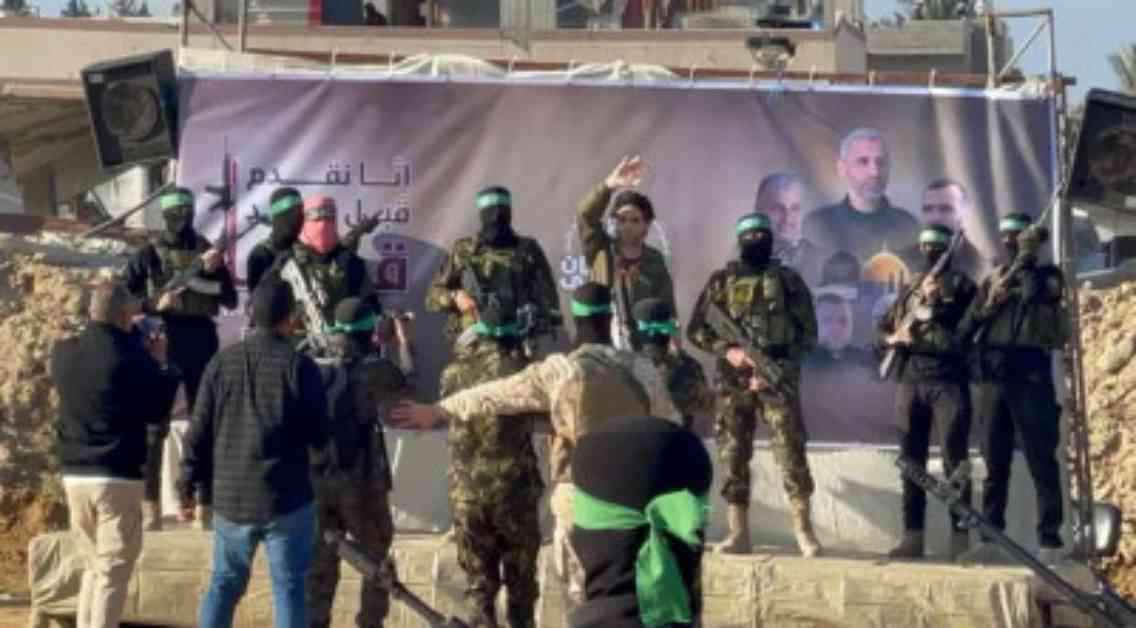Two More Israeli Prisoners Released by Hamas
Hamas has granted freedom to two more Israeli prisoners. Today, in the morning of February 1, 2025, two male Israeli captives, Ofer Kaldron and Yarden Bibasli, were released by Hamas. This news comes as another Israeli prisoner is expected to be released by them today.
The Israeli Defense Forces (IDF) have confirmed that the returning prisoners have crossed into Israeli territory with IDF assistance. They are currently heading towards a primary care center in southern Israel, where medical professionals will conduct their initial health assessments.
Prior to the prisoner exchange, there was a massive gathering of people in southern Gaza. The stage was adorned with multiple green and Palestinian flags as Hamas fighters brought the released prisoners to the platform.
Earlier, in a Telegram channel, Abu Obeida, the spokesperson for Hamas’ armed wing, had announced that Yarden Bibasli, Keith Seigel, and Ofer Kaldron would be released on Saturday. Additionally, 183 Palestinians who were detained in Israeli prisons will also be released today.
Palestinian authorities have confirmed the release of 183 individuals. Among these Palestinian prisoners, 18 had been serving life sentences, 54 had faced long-term incarceration, and the remaining 111 were arrested following the start of the Gaza conflict on October 7, 2023.
The latest developments in the ongoing prisoner exchanges reflect the delicate balance of power and diplomacy in the region. The exchange of captives is a significant step towards fostering peace and stability in the conflict-ridden Middle East. It signifies a willingness on both sides to engage in dialogue and negotiation for the greater good of their people.
Expert Insights: Impact of Prisoner Exchanges on Israeli-Palestinian Relations
As the prisoner swap continues between Israel and Hamas, experts weigh in on the broader implications of such exchanges. Dr. Sarah Cohen, a political analyst specializing in the Middle East, emphasizes the importance of building trust through humanitarian gestures like these. She notes that while the release of prisoners is a positive step, sustained efforts towards long-term peace and reconciliation are crucial.
Furthermore, Dr. Cohen highlights the psychological impact of such exchanges on the families of the detainees. The emotional toll of separation and uncertainty can have lasting effects on individuals and communities, underscoring the need for comprehensive support systems and trauma-informed care.
Community Reactions: Hope for a Peaceful Future
Amidst the news of the prisoner releases, communities on both sides express a mix of emotions ranging from relief to cautious optimism. In Gaza, families eagerly await the return of their loved ones, hoping for a brighter future free from conflict and strife. In Israel, there is a sense of cautious celebration as citizens grapple with the complexities of coexistence and peace-building efforts.
The ongoing exchanges serve as a reminder of the interconnectedness of Israeli and Palestinian lives, highlighting the shared humanity that transcends political boundaries. As the region navigates the complexities of conflict resolution, the release of prisoners stands as a beacon of hope for a more peaceful and prosperous future for all involved.
As the latest chapter unfolds in the complex narrative of Israeli-Palestinian relations, the exchange of prisoners serves as a poignant reminder of the human cost of conflict and the enduring quest for peace. Through dialogue, understanding, and mutual respect, both sides strive towards a future defined by cooperation, coexistence, and shared prosperity.



























